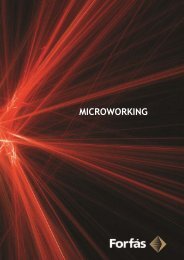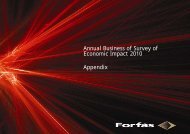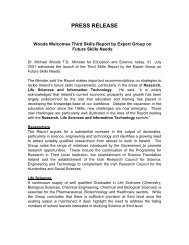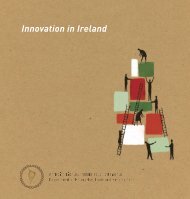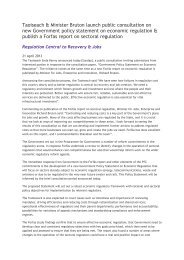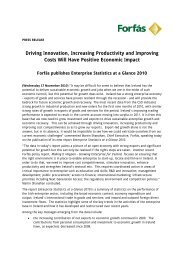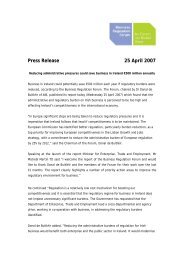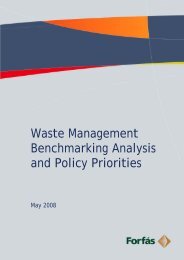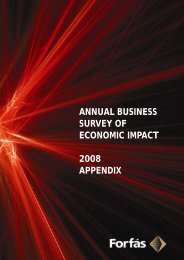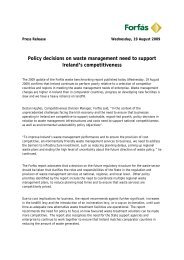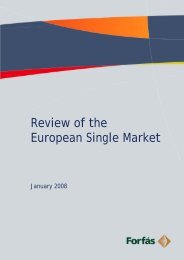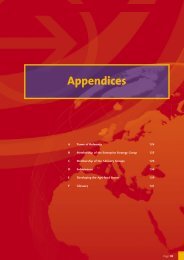Waste Management in Ireland: Benchmarking Analysis and ... - Forfás
Waste Management in Ireland: Benchmarking Analysis and ... - Forfás
Waste Management in Ireland: Benchmarking Analysis and ... - Forfás
Create successful ePaper yourself
Turn your PDF publications into a flip-book with our unique Google optimized e-Paper software.
2.4.3 Biological Gate Fees<br />
FORFÁS WASTE MANAGEMENT IN IRELAND: UPDATE 2010<br />
Although gate fees for food waste have decreased <strong>in</strong> <strong>Irel<strong>and</strong></strong> over the last years, they still<br />
rema<strong>in</strong> amongst the highest of the benchmarked countries/ regions.<br />
Figure 8: Biological Gate Fees for Food <strong>Waste</strong> 2007, 2008 <strong>and</strong> 2010 (€ per tonne)<br />
€100<br />
€90<br />
€80<br />
€70<br />
€60<br />
€50<br />
€40<br />
€30<br />
€20<br />
€10<br />
€0<br />
Fl<strong>and</strong>ers<br />
Source: RPS 26<br />
35<br />
Netherl<strong>and</strong>s<br />
40<br />
Sweden<br />
41<br />
2007 2008 2010<br />
Scotl<strong>and</strong><br />
47<br />
Mechanical-biological treatment (MBT) is the treatment of residual municipal waste through a<br />
comb<strong>in</strong>ation of manual <strong>and</strong> mechanical process<strong>in</strong>g <strong>and</strong> biological stabilisation. As an<br />
<strong>in</strong>termediate treatment option, some recyclable materials are recovered from the MBT<br />
process (such as solid recovered fuel (SRF)), but the majority of the residuals are usually sent<br />
to energy recovery, or to l<strong>and</strong>fill. MBT can thus provide an important outlet across a suite of<br />
waste management treatment options to reduce the quantity of biodegradable municipal<br />
waste which ultimately needs to be sent to l<strong>and</strong>fill <strong>and</strong> also <strong>in</strong> assist<strong>in</strong>g <strong>Irel<strong>and</strong></strong> achieve its<br />
recycl<strong>in</strong>g <strong>and</strong> emissions reduction targets.<br />
Biological treatment facilities can treat both food waste <strong>and</strong> green waste. For this<br />
benchmark<strong>in</strong>g report, fees for food waste only were considered as these are seen as the most<br />
relevant from the po<strong>in</strong>t of view of <strong>in</strong>ternationally trad<strong>in</strong>g bus<strong>in</strong>esses. Although gate fees for<br />
food waste have decreased <strong>in</strong> <strong>Irel<strong>and</strong></strong> over the last years, at €70 per tonne they rema<strong>in</strong><br />
amongst the highest of the benchmark countries/ regions. At the same time, it is important<br />
to note that fees for food wastes are becom<strong>in</strong>g more competitive when compared to l<strong>and</strong>fill<br />
26<br />
Notes: The gate fee for biological treatment relates to the treatment of food waste as this figure is<br />
seen as the most relevant from the po<strong>in</strong>t of view of <strong>in</strong>ternationally trad<strong>in</strong>g bus<strong>in</strong>esses. The gate fees for<br />
<strong>Irel<strong>and</strong></strong> are based on a survey carried out by RPS.<br />
Austria<br />
48<br />
Czech Republic<br />
66<br />
<strong>Irel<strong>and</strong></strong><br />
70<br />
Massachusetts<br />
71<br />
Denmark<br />
94<br />
21



